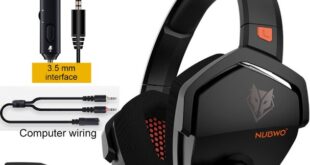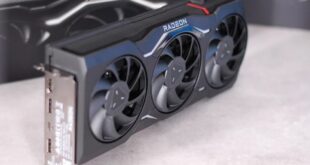GAMING SUPPORT – The Roccat Vulcan II Mini keyboard and its very compact format. We can notably mention Razer with its Huntsman Mini and Blackwidow V3 Mini , SteelSeries with its Apex 9 and Pro Mini, the K65 RGB Mini and K70 Pro Mini Wireless from Corsair or even Fnatic and its Streak65 . Only Logitech G still seems a little behind, but we imagine that their model will not be long in coming.
So with a little delay on the competition, can Roccat impose itself on this format more and more appreciated by the players? Response after a dozen days at his side.
Design & Ergonomics
The Vulcan II Mini generally takes up the design of the previous keyboards in the range and in particular the Vulcan and Vulcan TKL Pro that we had already had the opportunity to present to you on GamerTech.
The look of these keyboards is clearly one of their main strengths, with the various iterations of the Vulcan standing out quite a bit from the competition thanks to an airy and slender design, emphasizing RGB lighting.
The main novelty of this Mini version is thus found in its format, which as its name suggests now passes on a reduced model, here at 65%.
As a reminder, this design, even more compact than that of the TKL models, ignores the numeric keypad and the F1 to F12 keys. Faced with the 60% models, on the other hand, we retain direct access to the directional arrows as well as to an additional column on the right of the keyboard.
In practice, there is a tendency to favor this design at 65% rather than 60%. The difference in terms of dimensions is not huge and we gain in comfort of use as well as in productivity.
Dimensions
Once placed on a desk, the latest addition to the brand knows how to be discreet. With dimensions of 324 x 116 x 31 mm, the Roccat Vulcan II Mini adapts to the smallest spaces while providing a large sliding surface for mouse movements. An essential point if you are used to playing with low sensitivity. To give you a better idea, the animation below compares the Roccat model to a few other references that have already passed through our hands.
A little more in detail, the finishes of the keyboard are similar to those of previous Vulcans. We thus find a chassis with an always very thin design, here reinforced by an aluminum upper plate. The model takes the torture pretty well despite a fairly light weight of 500 g.
We also find these “floating”-looking keys, with these keycaps which only cover the upper part of the mechanical switches. It’s a bit of the hallmark of this Vulcan range and we must admit that visually the result is still just as convincing. Note that it is now possible to replace these keycaps with more traditional models if desired (cross stem).
Regarding the keycaps installed by default, Roccat does not specify their design but everything seems to lead to believe that they are ABS plastic models. Not necessarily ideal in terms of durability and fingerprints can quickly appear.
Accessible
On the command side, all the actions of the deleted keys obviously remain accessible via the FN key. You can also access some additional shortcuts to manage your music, the sound volume or the intensity of RGB lighting. Classic.
The Vulcan II Mini is also compatible with the EasyShift[+] option, found on most of the brand’s mice and keyboards. The feature provides access to an alternative mapping and therefore benefits from many additional shortcuts.
By default, the option is activated when you hold down the TAB key, but you can also imagine activating it from your Roccat mouse . These options are adjusted from the Roccat Swarm software that we present to you a little further down.
At the back of the keyboard, there are two retractable feet allowing the tilt to be adjusted on two levels. A rubber insert placed on the front part of the base ensures good stability to the whole.
Finally, let’s finish with a point on connectivity. The Roccat model works only wired, via a USB-C connector placed in the center of its rear edge. For once, we would have liked the manufacturer to finally offer a switch to wireless with this new version in compact format. The keyboard could thus have been placed as an alternative to the Corsair K70 Mini Wireless , Razer Blackwidow V3 Mini HyperSpeed or Cooler Master CK721 .
Roccat Swarm Software
As explained above, the different keyboard options can be configured via the in-house Roccat Swarm software. It is available free of charge from the manufacturer’s site and if you already have it, all you have to do is launch it and then update it.
The tool allows you to create up to 5 configuration profiles, which can then be automatically loaded according to your games or applications. Enough to allow it to display good versatility despite its compact format.
From the “Key assignment” tab, you can modify the secondary mapping of the keys, the one accessible via the EasyShift[+] functionality. Here, it is possible to choose among the different categories of actions already offered by Roccat or to create your own macros.
The EasyShift[+] option is activated by default by holding the Tab key, but only when the keyboard is in “Gaming” mode, which can be activated via Fn + Windows.
On the lighting side, they are configured from a second tab. Here you can choose between different effects or customize each of the keys with the color of your choice. Nothing really new on that side, even if we have to admit that some competitors offer slightly more complete options, including the possibility of customizing several layers of lighting.
A new tab is also appearing on the lower part of the software, allowing you to customize the second LED found on 30 keys of the keyboard, namely those offering a second mapping accessible via the FN key. To our surprise, only some of them are customizable, especially those dedicated to media or sound volume. For example, the second lighting of the numeric keys is not customizable, while the latter have two LEDs.
Also, for some keys the second lighting is always activated, while for others it only activates when the action in question is activated. In short, all this deserves in our opinion to be reworked a little and we hope that a firmware update will offer a little more latitude on the side of these second lights because the idea is rather good.
Overall, the Roccat software meets most of our expectations, but as often, we regret an interface that is not necessarily the most intuitive. The tool has changed very little in recent years and a global overhaul would be really welcome.
Switches & Performances
The Vulcan II Mini inaugurates the brand’s new optical switches: the Roccat Titan II Optical. They take up a design fairly close to the manufacturer’s previous linear switches, still with a total stroke of 3.6 mm, an activation at 1.4 mm and a force of 65 g. They are advertised with a durability of 100 million activations.
Without really giving more details about their design, the brand promises an even smoother activation with this second generation. These new switches mainly benefit from a revised design at the stem level, offering much better compatibility with other keycaps .
In use, these new switches are rather convincing and we benefit from a pleasant keystroke. Activation is perfectly responsive and the keyboard does well for both gaming and office use. However, not everyone will necessarily be a fan of the keycaps installed by default on the Vulcan II Mini and these require a little time to adapt to keys with a more classic design.
On the noise side, Roccat improves what we discovered on the previous Vulcan TKL Pro. The switches are quieter when activated and above all no longer resonate inside the chassis. Good news !
Conclusion
With this Roccat Vulcan II Mini, the brand presents its first mechanical keyboard in an ultra-compact format. Fans of the range will therefore now have the choice between three different sizes, with the classic “Full-Size” version, the TKL model and therefore this new 65% version.
The keyboard itself does not really revolutionize the sector. In addition to its design which contrasts a little with the competition, the rest is rather classic. Offered at the manufacturer price of €149 , we could have expected a little more from Roccat, with in particular wireless connectivity options or even a “Hot-Swap” design.


